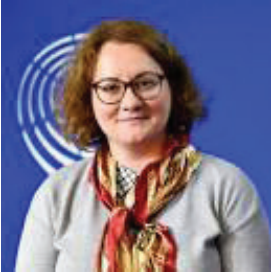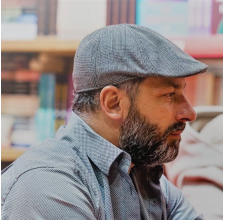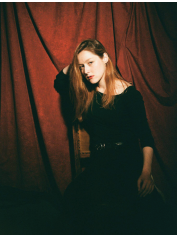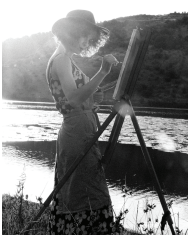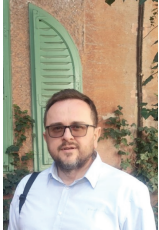Alba Çela is Executive Director and Head of the European Program at the Albanian Institute for International Studies. She holds a B.A in Political Science/ International relations from the American University in Bulgaria as well as an M. A in Nationalism Studies from the Central European University in Budapest. She has been a recipient of the prestigious John
Gunn scholarship at the University of Washington and Lee in Virginia. Alba Çela’s main areas of research are: democratization, political parties, national identity and European integration. Additionally, she participates as an independent expert in research, monitoring evaluation and advocacy projects for several international donors and organizations.
I am very happy, actually, and I feel privileged to be in this audience because this is one of the most pro-European audiences in all of Europe. We know from our surveys that are done every year, not only in Albania, but in all the Western Balkan region, that Albania and Kosovo are the most pro-European countries in the region, such as North Macedonia, Montenegro and in lower figures in Serbia, but in general, the support of young people for European integration and regional integration is quite high. And this support should not be taken for granted, because even in some European countries which are already members of the EU, if you do a survey or a poll, you might find surprising numbers of skepticism. And I believe this support is a very crucial asset; it’s something that we need to work with, because support means also acceptance of difficult reforms that are done for European integration.
What is the root of this support, for us, for example? Especially in Albania, the root of the support is actually the dream of ending the transition, it is what was written in those slogans in the protests: that we want Albania to be like the rest of Europe. It is a very symbolic and important thing. It’s not just about trying to become as prosperous, or trying to have good living standards as the European Union countries, but it’s also about having the same shared values. So, it is important for us to remember that this is actually not just a project, not just a process of European integration, but, in a certain sense, it’s a collective dream of our country and of our region. And I want to treat my talk today in terms of this metaphor. I try to find the metaphor of a dream, because I know that some people might be reflecting on this: “Why it is taking such a long time?” I thought, how can a dream become true or, in a frightening scenario, can a dream then become a nightmare? Hemingway has an expression where he says that sometimes things change, and in the beginning they change gradually, but then very suddenly. So, I wanted to treat this process of European integration and the time that it is taking: How can we avoid that this dream become a nightmare? Because we need a lot of assets of societal resilience in order to avoid this negative scenario. I’m happy actually that I’m sitting also with a colleague from North Macedonia[1], because in the process of European integration, for many reasons, which I don’t think we were expecting in the beginning, Albania and North Macedonia are going together, are coupled together. In some years, Albania has become an obstacle for North Macedonia, in some other years, what happened in North Macedonia was also an obstacle and it is a very interesting friendship now between the two countries that have suffered the same pain. But these are the best of friendships, actually, they are very durable, because once you go through hardship together, then you are long-term friends.
What has happened in the process of EU integration for our region, but especially for our two countries, Albania and North Macedonia, is that we have had many moments, difficult moments where this dream could have become a nightmare. We have had moments where political polarization and crisis has stopped the process. Maybe you don’t remember, but if you kind of try to look back in some years, Albania’s candidate status. The candidate status is a very symbolic thing, but it took us years. Something that should have been done much quicker took a lot of years because of internal problems, and in certain moments it did feel like a nightmare, while everything was being done and the reforms had started, then we cannot get this very symbolic milestone, to become a candidate country.
On the other side, so, here was our fault, because of our political crisis. Later on, we saw how the EU and certain countries inside the EU became a nightmare for us with their vetoes, with their delays, and with demands that sometimes did not feel like they were about European standards; sometimes they felt like double standards. We had moments that we had to be very, very patient. North Macedonia more patient than us, because they made bigger sacrifices. We were introduced with new conditions, such as the new methodology, which was the argument that France, one of the countries that is, let’s say, not very enthusiastic about enlargement, and is instead more focused on widening and deepening the project of the EU itself, opposed this request of the new methodology, but what did we observe after they posed this request, is that they didn’t follow through with this request, they didn’t help North Macedonia, for example, to get the opening of negotiations so that they could test the new methodology, and as of today, the new methodology is still not tested, because, yes, in July, Albania, North Macedonia opened the negotiations, but we are still to see the new methodology in action chapter by chapter.
Other nightmares that we have gone through is media coverage about our countries. For Albania, you know that in many European countries, for example, the Netherlands, or the UK when it was part of the Union, Albania had very negative media image. Do we deserve this media image? My answer would be no, we don’t deserve it. We have problems, but the way we have been pointed out is not fair, and we have tried to tell this to our European colleagues, and this media coverage often influences the political decisions and often becomes an obstacle for European integration.
What does a nightmare really look like? The biggest nightmare is when the European integration becomes devoid of substance, when it becomes an exercise that you have a list of requests and you say “Okay, I’ve done this. Check that box.” “I’ve done this, check this box” This is not European integration. It’s a to-do list that we do for ourselves on Monday, and we say “I’ve accomplished these things. Check, check, check.”
European integration is about real transformation. So that is the nightmare: when citizens do not participate in it: when they do not see their achievements, when they don’t look for accountability, when they don’t feel the real benefits, and as you are young people, which are the fields that you should be looking for? Do we have the same opportunities in education? I sometimes make a joke with people who are skeptical about enlargement and I say: “Okay, if you don’t want to take us in, at least make the tuition free in the European universities. It is a step that you can do to offer equal access to education”. It’s about volunteering opportunities, it’s about becoming a part of European civil society. We are a very active region and we collaborate a lot between each other, but we do not collaborate a lot as a region with European peers.
I’ve been working twelve years in my organization and I’ve done a hundred projects, most of them with the Western Balkans countries, but very few projects with EU think tanks and organizations. So there is a lot more space to explore opportunities for being connected while we are in the process of EU integration.
About regional cooperation, what I want to say is that there is a difficulty in the process of regional cooperation, which comes from the fact that regional cooperation is like a circle, it’s a request of the EU for us, so you have to collaborate between each other in order to progress in European integration, but at the same time it’s supposed to be a byproduct, so as you go together through these reforms and through this cooperation, then peace and prosperity will be produced at the regional level.
So, I think it is a circle that is supposed to feed itself, like a virtuous circle. The problem is that sometimes we have seen it become a vicious circle. So, with certain moments that it has not worked, and, you know, there are tens or thirty platforms of regional cooperation, but our real commitment in them is really different. There are new ideas, as you know, such as the Open Balkans, which, the difference between Open Balkans and the other regional cooperation mechanisms is that Open Balkans came from the region. All the others are kind of coming from outside, but you can all see that at least in these years of its functioning, it has been very divisive, so only three countries are in and the three countries that are out they are not just out, they really hate it so far, so we still need to see if this will become a successful, inclusive platform.
Another thing that has come back in the region, from the point of regional cooperation is the Berlin process. There are high hopes and expectations. I think we expect a lot from Germany, because we know it’s the engine, economic engine of the European Union, but I have, myself, a criticism for the Berlin process at least in the first phase: it has these huge projects and ambitions, but most of them remained on paper.
So we’ll see now, in the second phase, if they’ll really become something with real benefits. Don’t forget: all of you can go to Rome, you can go to other European capitals, probably with a direct flight; if you try to go to Sarajevo, it’s a nightmare: you have to go to Vienna, to Belgrade, or sometimes even to Istanbul to go to Sarajevo, a country so close to us it’s part of our region. This is connectivity; this is regional cooperation: when we can really easily reach each other, so that we can work with each other.
Who are the people that prevent the dream from becoming a nightmare? It’s the young people. I know some young people who are trying to make this dream come true, but not waiting. They are packing their bags and leaving. We know this: leaving for their studies, for their work. In a certain sense, they are voting with their feet. By leaving, they are voting. They are saying that they are not going to wait anymore. And this is supposed to cause a lot of trouble in the region, but at the same time, I don’t want to be pessimistic, there are many, many, many reasons in our daily life to be pessimistic, so it’s really hard to find some hope, but to live is to resist and to find some hope, so in the same time, there are many young people who are trying to be active. You are in an organization, other people are in other organizations. You now have some platforms such as RYCO, Regional Cooperation Office for the youth, or the Western Balkan Fund. Don’t forget, these are two things that are very new for Tirana. Before, for every regional thing, we had to go to Belgrade or to Athens, even for us as civil society. Now we have two important organizations in Tirana that can facilitate through funds, through exchanges, cooperation between young people in the region, which is so fundamental because it builds the peace that we need, because it creates innovative ideas on how to make our economies work for young people and also to facilitate the cultural exchanges which are so necessary.
So, yes, it’s been very long since we – since our fathers, or brothers, or friends – were protesting with these slogans that we want Albania to be like the rest of Europe, but the effort goes on and we should not forget that this is our only plan. We don’t have another plan. We need to become a part of the European Union just like we became a part of NATO. We are anchored in the west. Our values, our character, our future is anchored in the west. So, if it takes a bit more patience to make the dream come true, just try to see the ways that, while we are working to do this, we can see some real benefits for young people.
[1] Robert Alagjozovski. See has presentation in this same issue of “The Bridge”.

